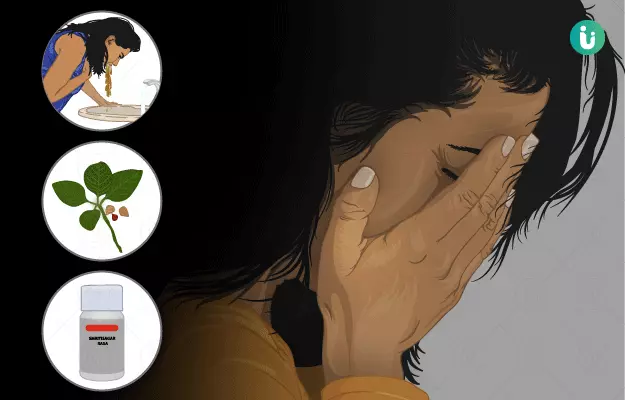Schizophrenia is a mental condition characterised by hallucinations, depression, mood swings and delusion. It affects thinking and perceiving skills which ultimately alters behaviour.
According to Ayurveda, schizophrenia cannot be correlated with a single type of mental disorder but schizophrenia symptoms match with the symptoms of many types of unmada (mental disorder).
Consuming unhealthy and contaminated drinks and foods, loss of mental balance, and poor lifestyle choices are some of the causative factors for vitiation of doshas, which, in turn, lead to mental disorders like schizophrenia.
Panchakarmas (five therapies) including virechana (purgation), vamana (medical emesis), snehana (oleation) and tapa (fomentation) are recommended as the primary line of treatment for schizophrenia along with brain tonic herbs such as ashwagandha (Indian ginseng), jatamansi (muskroot), sarpagandha (Indian snakeroot) and vacha (calamus) and formulations like saraswatarishta and mahakalyanak ghrita.
- Ayurvedic view of Schizophrenia
- Ayurvedic treatment for schizophrenia
- Ayurvedic herbs and medicines for schizopphrenia
- Dietary and lifestyle changes for fever patient as per ayurveda
- How effective are ayurvedic medicines and treatments for schizophrenia
- Side effects and risks of ayurvedic medicine and treatments for schizophrenia
- Takeaway
Ayurvedic view of Schizophrenia
Charaka Samhita describes unmada as the perversion of consciousness, intellect, behaviour, mind, desire, knowledge, conduct and manners, and memory. As per Ayurvedic texts, vitiation or unmarga (deviation) of doshas and imbalance in inner energy are the major causes of schizophrenia. Ayurvedic doctors recommend pranayama, visualisation methods, mantras, meditation and prayers for the treatment of schizophrenia. Depending on the dosha involved, people with schizophrenia experience the following symptoms:
- Pittaja unmada: People with pitta-related unmada show symptoms such as anger, threatening behaviours, and indigestion after eating sour, hot or pungent foods. All the symptoms worsen at night.
- Vataja unmada: Symptoms of vata-related unmada include singing, talking, laughing or bursting out inappropriately or imitating the sounds of musical instruments. Memory loss is also a major symptom of this type of unmada.
- Kaphaja unmada: People with kapha-related unmada lack the desire to eat and loves solitude. Mental symptoms worsen at night after dinner. Vomiting, depression, lack of motivation and passivity are some of the other symptoms seen in kapha-related unmada.
Herbs and formulations that are used to treat schizophrenia vary according to the type of dosha affected. Ayurvedic approach for treating all mental disorders including schizophrenia includes the improvement of mental clarity by promoting healthy lifestyle changes. In addition, yoga and meditation are also recommended to improve concentration and overall body health. Along with the main panchakarma therapies, Ayurveda describes other treatment procedures including shirodhara (pouring liquids or oils over the head), abhyanga (oil massage) and administration of medicines mixed with mustard oil to treat schizophrenia.
Ayurvedic treatment for schizophrenia
- Virechana
- Purgation or virechana therapy is specifically useful for eliminating excess pitta from the body through the rectal route.
- It is helpful in treating health conditions like jaundice, asthma, skin diseases, gastrointestinal disorders and mental conditions like insanity and epilepsy.
- Internal oleation is done before performing virechana therapy.
- After undergoing virechana therapy, a feeling of lightness is felt in the abdomen along with improvement in appetite.
- This therapy is primarily indicated for the treatment of schizophrenia due to pitta type of unmada. It eases pitta-related irritability, anger, anxiety, insomnia and fearfulness.
- Snehana
- Snehana therapy uses lubricants for oleation of the body externally or internally.
- It helps mobilise toxic materials from various sites of the body so that they can be eliminated with ease.
- To perform snehana, oils are either used topically, orally, in the form of an enema or administered through the nasal route.
- When used externally, a thin layer of oils is applied to the skin which is then followed by a massage.
- Oleation is useful in treating pitta or kapha type of mental conditions.
- Vamana
- Vamana therapy helps eliminate excess pitta and kapha from the body. Therefore, it is effective in treating schizophrenia caused due to an imbalance in pitta- or kapha dosha.
- Madanaphala (emetic nut), vidanga (false black pepper), kutaja (kurchi), and nimba (neem) are some of the commonly used herbs for vamana karma.
- This therapy is helpful in treating anorexia, respiratory conditions, skin conditions, ulcers and sinusitis.
- For people with pitta-related unmada, vamana should be performed after carrying out oleation and sudation therapy.
- Tapa
- Tapa or fomentation is a type of swedana therapy that is very effective in liquefying ama (toxins) and purifying body channels.
- In tapa therapy, fomentation is performed using heated metal objects or cloth. It helps draw out excess kapha and vata doshas from the body. Warm hands are also used for this process.
- Tapa is recommended along with snehana before undergoing vamana and virechana therapy in people diagnosed with unmada.
Ayurvedic herbs and medicines for schizopphrenia
Ayurvedic herbs for schizophrenia
- Jatamansi
- Jatamansi is a bitter-tasting herb, which has astringent (constricts body tissues), diuretic, nervine (soothes nerves), aromatic, stimulant and digestive properties.
- It is an excellent sedative (induces sleep) and brain tonic and helps calm down anxiety and anger in individuals diagnosed with schizophrenia.
- Jatamansi reduces mental stress and treats headaches, digestive problems, kidney stones, skin conditions and heart palpitations.
- It is also useful in treating insomnia, hysteria and epilepsy.
- You can take jatamansi in the form of a powder, infusion or as per your physician’s direction.
- Sarpagandha
- Sarpagandha works on the respiratory, excretory, circulatory and nervous systems.
- It is typically prescribed for managing hypertension. This herb also provides relief from symptoms of violent manic attacks.
- Sarpagandha helps reduce stress in individuals with schizophrenia.
- Along with mental conditions, sarpagandha is also useful in treating fevers, dysentery, insomnia and painful bowel conditions.
- You can take sarpagandha in the form of a pill, decoction, powder or as per your physician’s direction.
- Brahmi (waterhyssop)
- Brahmi has digestive, rejuvenating, nervine and diuretic properties.
- It is known as the best herb for enhancing intelligence and promoting rejuvenation of brain cells and nerves.
- Brahmi improves nervous system functions, treats skin conditions like psoriasis and boosts immunity.
- Being a mild stimulant and sedative herb, it is helpful in improving mood.
- You can take brahmi in the form of a powder with oil or ghee (clarified butter), infusion, decoction or as per your physician’s direction.
- Ashwagandha
- Ashwagandha is an excellent brain tonic, which is known to enhance the function of nervous system and reduce mental stress.
- This herb is useful for treating several mental conditions including anxiety, neurosis, insomnia, bipolar disorder and ataxia.
- Ashwagandha helps in the production of ojas and pacifies vata levels in the mind, which leads to improvement in unmada symptoms.
- You can take ashwagandha in the form of a herbal wine, decoction, powder with ghee or oil, or as per your physician's direction.
Ashwagandha aids stress relief naturally. Elevate well-being. Limited stock. Order now for a calmer, balanced life.Urjas Ashwagandha Tablet by myUpchar Ayurveda
- Vacha
- Vacha has stimulant, rejuvenating and decongestant properties.
- It is useful in improving memory and treating epilepsy, polyps, mental shock, cold and asthma.
- Essential oil of vacha mixed with camphor and other herbs reduces dullness associated with depression and detoxifies the channels of mind.
- Vacha is especially useful in treating vata and kapha type of unmada.
- You can take vacha in the form of a powder, decoction, paste, milk decoction or as per your physician’s direction.
Ayurvedic medicines for schizophrenia
- Mahakalyanak ghrita
- Mahakalyanak ghrita is prepared from 31 herbal ingredients including turmeric, cow’s ghee, sandalwood, manjishtha (Indian madder), cow’s milk, vidanga and cardamom.
- This medication is primarily indicated for the treatment of schizophrenia and other mental disorders.
- It is also useful for treating amnesia and stammering.
- Saraswatarishta
- This herbal formulation includes 23 ingredients such as vidanga, gold, vacha, guduchi (heart-leaved moonseed), sugar, shatavari (hundred roots), ashwagandha, honey and brahmi.
- This medicine is used to restore mental harmony and enhance memory. It is also indicated for the treatment of mental disorders, fear and stammering.
- You can take saraswatarishta with milk or as per your physician’s direction.
- Unmada gaja kesari
- Unmada gaja kesari is a mixture of manashila (red arsenic), gandhak (brimstone), parad (mercury) and dhatura (devil’s snare) seeds. This mixture is infused with vacha or rasna (Indian camphorweed) decoction.
- It is primarily indicated for treating unmada and apasmara (epilepsy).
- Smriti sagar rasa
- The polyherbal formulation of smriti sagar rasa is prepared by mixing gandhak, tamra (copper), parad, manashila and haritala (yellow orpiment) with vacha decoction, jyotishmati oil, or brahmi juice.
- This medicine helps improve intelligence and is used for the treatment of apasmara.
- Brahmi ghrita
- Brahmi ghrita is prepared using various Ayurvedic herbs including trikatu (a combination of the three acrids – pippali [long pepper], shunthi [dried ginger] and maricha [black pepper]), brahmi, vidanga, cow’s ghee, aragvadha (golden shower) and 12 other ingredients.
- Brahmi ghrita is used in improving memory and sharpening intelligence. It is effective in the treatment of mental disorders such as depression, phobia, insanity and mania.
- This medicine also improves concentration and helps reduce bedwetting and stammering.
As treatments vary according to numerous factors and an individual’s prakriti (constitution), consult a qualified Ayurvedic doctor for appropriate medications and treatments for your specific complaints.
Dietary and lifestyle changes for fever patient as per ayurveda
Do’s
- Follow a healthy diet and routine.
- Practice meditation, pranayama, asanas and mantras to achieve sattva.
- Consume fresh food without chemicals.
- Include old rice, mudga (green gram), kushmanda (wax gourd), patola (pointed gourd) leaves, grapes, brahmi leaves and fresh cow milk in your diet.
- Use spices like basil, ginger and cardamom. They help open up the heart and mind.
- Include ghee in your diet as it helps improve memory and intelligence.
- Follow healthy eating habits like resting after consuming meals; chewing food properly; not watching television, listening to music or having any other distractions while eating; sitting properly while eating food, etc.
- Go to bed early and take sufficient sleep.
Don’ts
- Do not rush; it may cause anxiety and disrupt the mind.
- Do not eat hot foods or incompatible food combinations such as fish and milk.
- Do not consume wine.
- Do not suppress your natural urges like thirst, sleep and hunger.
How effective are ayurvedic medicines and treatments for schizophrenia
A recent open-labelled uncontrolled clinical trial demonstrated the efficacy of Ayurvedic medicines and therapies in the treatment of schizophrenia. The research comprised a group of 15 individuals diagnosed with schizophrenia, who were given snehana with mahakalyanak ghrita along with oral administration of vacha. Other Ayurvedic herbs and formulations were also given along with these medications. Significant improvement was observed in schizophrenia symptoms such as delusion, hallucinations within 2 weeks of the treatment. An overall improvement in the quality of life was also noted.
Side effects and risks of ayurvedic medicine and treatments for schizophrenia
Ayurvedic medicines and treatments are usually safe when taken under the supervision of an experienced doctor. However, not all remedies suit everyone equally and depending on individual prakriti certain herbs and therapies may prove to be harmful. Let us have a look at some of these side effects:
- Excessive purgation during the virechana therapy may cause drowsiness, syncope, abdominal pain, bloody discharge from anus and weakness.
- Vamana therapy is contraindicated in pregnancy. It is not recommended for children and elderly. People who have difficulty with emesis and a strong digestive fire should not undergo this therapy therpy as it can create an imbalance in pitta or vata doshas in them.
- Sarpagandha can prove fatal if taken in large doses.
- People with congestion problems should not take ashwagandha.
Takeaway
Schizophrenia is a medical condition that reduces the thinking and perceiving skills of an individual. It not only affects the person diagnosed with it but also has an impact on the everyday life of their family and friends.
Ayurvedic herbs and medicinal formulations act as brain tonics and enhance awareness and brain function in schizophrenia patients. Panchakarma therapies play a vital role in drawing out toxins and bringing back the balance in the vitiated doshas that are responsible for causing most of the diseases. Along with the herbs and medicines, pranayama, yoga and other relaxation techniques are also recommended to achieve faster healing and promote the quality of life.
Find Ayurvedic Doctor in cities
Doctors for Ayurvedic medicine, treatment and remedies for Schizophrenia

Dr. Ayush Bansal
Ayurveda
2 Years of Experience

Dr. Megha Sugandh
Ayurveda
6 Years of Experience

Dr. Nadeem
Ayurveda
3 Years of Experience

Dr.Ashok Pipaliya
Ayurveda
12 Years of Experience
References
- Nishant Singh. Panchakarma: Cleaning and Rejuvenation Therapy for Curing the Diseases . Institute of Clinical Research India; New Delhi
- Swami Sada Shiva Tirtha. The Ayurveda Encyclopedia. The Authoritative Guide to Ayurvedic Medicine; [Internet]
- Sukanto Sarkar et al. Add-on effect of Brahmi in the management of schizophrenia. J Ayurveda Integr Med. 2012 Oct-Dec; 3(4): 223–225. PMID: 23326095
- Central Council for Research in Ayurvedic Sciences. Diseases. National Institute of Indian Medical Heritage; Hyderabad
- Sudha Prathikanti. Ayurvedic Treatments: Complementary and Alternative Treatments in Mental Health Care. American Psychiatric Press; Washington, D.C











